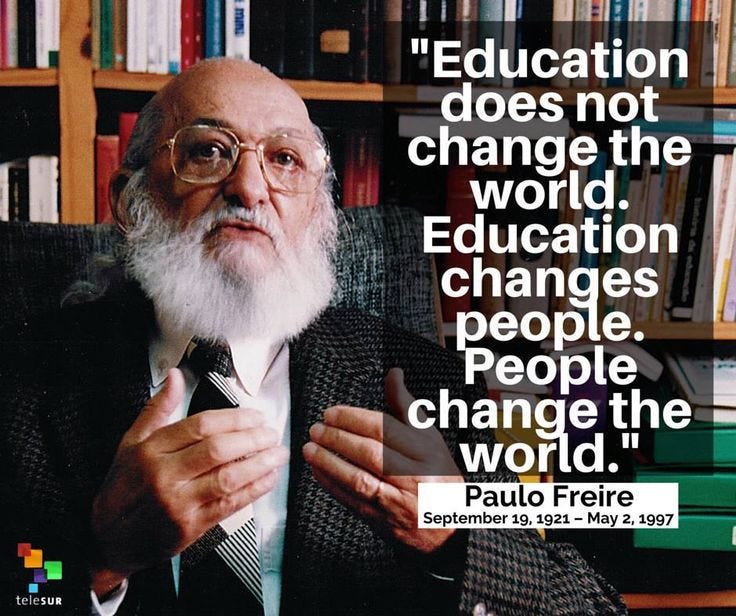Paulo Freire on Education

In a previous article, I discussed some of philosopher Paulo Freire’s views on political conflict. Though he didn’t shy away from politics, Freire was first and foremost a philosopher of education. In this article, I want to introduce you to some of the views of Paulo Freire on education. As a teacher, I find his ideas sensible and a breath of fresh air amidst the increasing corporatization of education.
While working as a teacher in the early 1960s, Freire came to realize that widespread illiteracy was related to authoritarian attitudes which bred an environment of oppressions. He saw that authoritarianism was deeply ingrained in all aspects of society, even in how parents related to their children. He saw that education is more than learning skills. Education is a process about people discovering themselves as creative agents and becoming more human. The value of education, for Freire, was not simply being better able to make a living in a profession but empowerment and transformation for an individual and community. Education, well done, leads to social justice.
These thoughts are similar to those of John Dewey. Dewey thought that education is best when it is active involvement, not passive seeing or hearing. Good education teaches individuals how to solve problems and better engage with their society. Students need to be active questioners — hands-on in both practices and dialogue. Discussion is an important part of education. Freire especially emphasized the importance for students to be included as equal discussants.
Also similar between Freire and Dewey is that idea that students are individuals. Too often, education is conducted en mass with a single lecturer speaking to dozens or hundreds of students. Dewey thought that in schools, students were seen as theoretical spectators who were under the instruction of experts. Dewey criticized education and academia itself as not perceiving the uniqueness of individuals. Individuals have an “infinite diversity of active tendencies” and education, and society as a whole, must account for this.
The banking concept of knowledge
Freire says that this traditional dichotomous and authoritarian model of education assumes that experts bestow their gift of knowledge to those who know nothing. This model not only perpetuates oppressive dynamics, it is an ineffective method of education. Freire called this the “banking concept of knowledge.” The bank holds the knowledge and people must come to the bank to receive it. The bank of knowledge is also separate from the people. As Freire wrote in Pedagogy of The Oppressed:
Implicit in the banking concept is the assumption of a dichotomy between human beings and the world: a person is merely in the world, not with the world or with others; the individual is spectator, not re-creator.
Freire argued that this banking concept of knowledge perpetuates hierarchies of power, reaffirming the oppressive dynamics of powerful and powerless. Freire connects the banking model of education to colonialism. The oppressive dynamic of colonialism is that the colonizing culture sees itself as possessing value while the colonized culture does not. Being Brazilian, Freire saw the legacy of colonialism in his country as an oppressive dynamic that permeated all levels of society, including education. Even well-meaning teachers who wish to treat their students as valuable individuals are caught within a system of education that enforces the colonial dichotomy.
Education is never a neutral process, Freire says. Education presupposes about students either inequality between teacher and student or it enters into dialogue with students. The former presupposition perpetuates dichotomies of the banking model and traps students in hierarchies of power. The latter presupposition sees students as equal human beings deserving of trust and respect. It does not mean thinking all students know as much as the teacher. That would be counter-productive. It does mean empowering students to learn. It means seeing education as a process of facilitating practice and critical reflection.
Applying Freire’ insights
The Freire Institute says that “A typical feature of Freire-type education is that people bring their own knowledge and experience into the process.” This is a fundamental pedagogical shift from talking down to students to including students in a process of learning. As an educator myself, I remember disliking teachers and professors who were imperious and condescending. I try to keep that in mind when I teach. When people are included in a process of education, they are empowered to learn. Some of Freire’s basic concepts on the process of education can be found here. Paulo Freire on Education
It is not easy or pleasant to take in the ideas of Paulo Freire on education. They are radical and infused with critique of broader society. Many teachers, myself included, see much of Freire’s views as eye-opening, even refreshing. There is a real danger though in over-simplifying his insights. Is there really no line between education and political activism? Such a view could be easily taken from Freire’s insights. What does, in practice, students as equals mean? How can Freire-type education processes thrive within the current large-scale educational structures, such as universities? Or can Freire-type education only work in small communal schools? If we reject the banking model of education, as it seems we must, what does that mean for people who are, through their own effort, experts in their field?
These are just some preliminary questions. The Freire Institute is working on these and others. I am no expert on Freire, having only recently discovered his thought. No surprise that he is not well disseminated in Anglo-American universities. I invite the reader to explore for themselves.
More on Paulo Freire on Education:
Freire on the Internet Encyclopedia of Philosophy.
Philosophy of Education (Stanford Encyclopedia of Philosophy).
Originally published at https://insertphilosophyhere.com/paulo-freire-on-education/





